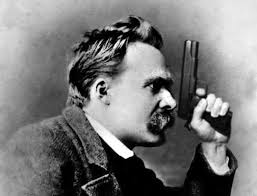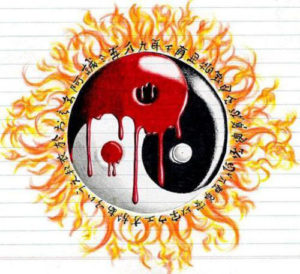
Category: history
Why Nietzsche is Hard

The experience of reading and contemplating Nietzsche is fundamentally different to that of the majority of thinkers. A natural consequence of this is the unprecedented degree to which Nietzsche is misunderstood.
Appreciating Nietzsche isn’t a simple matter of considering a number of competing claims to the truth and deciding if his case is the strongest. He is not such a man that will brook standing in the dock while his ideas are tried by plebs.
Nietzsche is hard for the same reason that integrating a psychedelic trip is hard. This is because to understand him, first you have to concede to his basic contention: that everything you know might be wrong. This makes Nietzsche appear to be a nihilist for anyone who stops reading him at this point, which most people do.
But to appreciate Nietzsche, at least initially, you have to accept that the very way you think may be fundamentally flawed.
His contention is that people have been lied to so often by the church, by the state, by centuries of half-wit philosophers, by power-crazed kings and by the bleating of the herd, that they’re too confused to even begin thinking their way out of it. The way people think is so fundamentally flawed that to make progress the first point of order is to forget all the lies that they currently consider to be true – and there are many.
In fact, you can’t merely forget them – you have to deliberately and purposefully smash them. To get to the truth you have to escape the labyrinth of lies, and so you have to “philosophise with a hammer”.
Understanding the truth of Nietzsche is thus not a pleasant and straightforward experience like sitting in a kindergarten listening to the sweet voice of a kind teacher guiding you gently away from ignorance. It’s more like Hell Week of the Navy Seals, in which a person’s entire personality has to be torn to the ground so that a new, stronger one can be rebuilt in its place.
Regular readers of this column will recognise this phenomenon as the task of the mystic, the shaman or the schizophrenic. Nietzsche himself clearly recognised this when he subtitled Thus Spake Zarathustra as “A Book fof Everyone and No-one.”
This is very evidently not a task for the man of clay; Nietzsche had no intention of founding his own religion for the masses (probably this explains the appeal of Nietzsche among those of the left-hand path).
All of this helps to explain why the name of Nietzsche has been associated with the Nazis.
Any political power who seeks to tear down the established order (which in Hitler’s time was the Anglo-American Empire) and impose their own based on transvaluated values (the Nazi Empire) has one immense – but superficial – connection with Nietzsche’s philosophy in so far that both are revolutionary.
Both seek to tear down old ways that they see as corrupt or decadent. Indeed, crusades against ‘decadent’ art was one of the ways the early Nazis built outrage in their favour, and rhetoric about the corrupting effect of Jews on German society was regular.
Moreover, Nazism was one of the most striking historical examples of a supremacist movement, and supremacists of all stripes find a superficial interest in Nietzsche’s talk of the ‘Superman’.
The great irony here is that Nietzsche would likely have considered the Nazis – like all egoic supremacists – a pack of plebs.
Is It Time For Gay and Lesbian New Zealanders to Lose Their Victim Status?

Apart from Rugby World Cup trophies, the one thing that New Zealanders fight for with the most intensity is victim status. Being a victim in our society is to wield the power of laying guilt trips on people, which often brings with it a free media platform to convince people to stop their behaviour and adopt others more to the guilt-tripper’s liking.
Once you have achieved the status of victim no-one can disagree with you without feeling ashamed because if they disagree with you they automatically become part of the oppressor class, who all New Zealanders have been conditioned since kindergarten to reflexively despise.
This social pressuring has an extremely powerful influence on the thoughts and feelings of the individual, but the problem with this cozy arrangement is this.
The reason why gay and lesbian New Zealanders have, as of right now, an impregnable position at the very summit of Mount Victim is that being gay and lesbian is not highly correlated with significant measures of social deprivation in the country today.
The average homosexual is actually fairly wealthy on account of being both better educated than average and being less likely to have children, a phenomenon known as the pink dollar.
There’s no denying being gay and lesbian once was highly associated with measures of social deprivation and disenfranchisement. This is inevitable when you can literally get locked in a cage for being who you are. The contention of this column, however, is that this battle has long been won.
Homosexuality became illegal in 1840 in New Zealand and legal again in 1986 – now thirty years ago – so the people that enforced the legal prohibition on it are all long ago dead and buried.
In the 2011 General Election, seven gay or lesbian MPs were elected to Parliament, which is almost six percent of the total – over twice the actual proportion of gay and lesbian New Zealanders (and this is ignoring the known homosexual MPs who are just not public about it).
If your marginalised group is represented in Parliament at 250%+ of its proportion among general society, so much so that when a law is passed in your favour the entire Parliament will band together and sing a song of regret that they didn’t do it sooner, are you really that marginalised?
The irony of the eternal battle for victimhood is this: once your victim status is recognised by your society at large, you are automatically no longer a victim, because you are instantly doing much better than all the oppressed people whose victim status is not recognised.
The reverse of this is also an irony: in order to get into a position where you can do anything about being a victim, you have to get into a position where you are no longer a victim.
This is why the physically and mentally infirm will always be at the bottom of society – simply because they are in the weakest position to advocate for themselves. It is exceptionally rare to meet a sick person wearing a suit and who is articulate as Grant Robertson.
So perhaps it’s time for another marginalised group of New Zealanders to get some attention?
If you are one of New Zealand’s 400,000 medicinal cannabis users, getting completely ignored by all parties is galling when you can turn the television on and hear Jacinda Ardern passionately arguing for legalising gay adoption – an issue which affects perhaps 50 people a year.
Every day you are ignored is another slap in the face, another insult. But no-one will bring up your plight in Parliament, ever, and merely to point out that it’s time for you to displace some of the wealthy and powerful people raking it in at the victim table is seen as effrontery (no doubt many people will read the headline of this article and become outraged without reading the body).
That’s a real victim of societal prejudice.
Why There Always Has Been War And Always Will Be War

It’s as simple as looking at a yin-yang, and knowing that the yin represents chaos and the yang represents order. Keeping in mind the Fifth Hermetic Principle – the Principle of Rhythm – we can surmise that it is true of order and chaos that “the measure of the swing to the right is the measure of the swing to the left.”
In a Taoist sense this is to say that an excess of order, by its very nature, leads to a minuscule element of chaos arising within it, which grows, and soon takes on a momentum of its own, only to itself crystallise from a tiny seed into order, and ever more rigid order, until the cycle begins anew.
Too much masculinity in the alchemical world is represented as fire and iron, and these stand as metaphor for how too much masculinity in the physical world leads to violence.
An excess of masculinity is like fire when it has too much energy because it causes violence which burns flesh and sears souls, and is what the ancient physicians meant when they diagnosed a person with a choleric personality.
It is also like iron when it imposes too much order because it is harsh and cuts mercilessly, and when it breaks down it shatters, as with an excess of masculinity one loses one’s ability to yield and to withdraw and breaks like a tree that cannot yield to a storm.
This is evident in the natural world even when one looks at biological life in the simplest way. A seed that sprouts and begins to grow towards the light must eventually break the surface if it is to survive (for a literary description of this phenomenon see Chapter 21 of Anna Nilsen’s Writing With The I Ching: Biting Through).
As below, so above: the world of men is no different. If a person observes the current order of the day and finds it unworthy of continued existence, then – if they are intelligent – they will soon come to appreciate the degree to which, and the vigour with which, the established order maintains itself (indeed, that’s all that order is).
But like the rising yin, the desire to break the established order – once it takes hold – grows ever more powerful by virtue of its position within nature. As the dusk darkness consumes ever more of the light, so does the chaos dissolve ever more of the existing order, until it breaks through and imposes an order of its own.
If you look at the current state of world history, there is an established Anglo-American order, which has dominated world affairs for about 200 years. This order is generally known as ‘The West’, because it represents the powers on the Western side of the world when viewed as a chessboard.
This world order arguably began at Waterloo, when the then wielder of the Spear of Destiny – Napoleon Bonaparte – was defeated in battle and the First French Empire sundered.
The nature of yang is to decline into yin – we know this, and already it’s possible to observe an America in cultural decay. Already the American Empire has degenerated in certain ways further than any empire in history, with the most recent 50 years giving us everything from Charles Manson and Ted Bundy to Hillary Clinton and Donald Trump.
The nature of yin is to rise into yang – and this can be observed with the awakening of the sleeping giants of China and India. These countries were poor and were always going to remain poor as long as they were too corrupt to organise any meaningful invest in the human capital of the young. This was how it was when the Spear of Destiny was held in Europe, but now, as it crosses the Pacific, the East is awakening.
There is every chance that a rising Eastern power that wants its place in the Sun will naturally come into conflict with the established Western one that wants to hold onto power. Indeed, many believed that the Japanese action in the Western Pacific theatre of World War II was this event playing out (this column is far, far from the first to suggest it).
The collapse of the established order is not a matter of if, it’s a matter of when. The established order never collapses peacefully (observe adult male elephants for an analogy in the natural world).
Therefore, war is a fundamental aspect of life, and always will be, as long as there are masculine and feminine.
